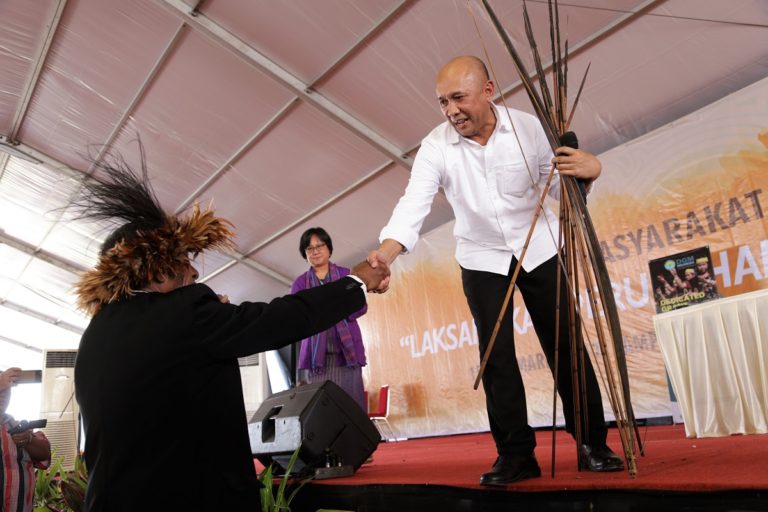- President Joko Widodo’s administration announced some new initiatives at this week’s indigenous peoples congress in Sumatra, but not the task force on their rights participants had been hoping for.
- The president’s chief of staff said it was more efficient for the Ministry of Environment and Forestry to address the matter directly.
- Attention now turns to who will be selected to lead the Indigenous Peoples Alliance of the Archipelago for the next five years. A decision will be made on Sunday.
TANJUNG GUSTA, Indonesia — Presidential Chief of Staff Teten Masduki was the object of a forceful gesture yesterday when a Papuan man approached the stage on which he was sitting during a rare indigenous peoples congress now underway in this Sumatran village.
“Here are eight arrows — in eight months, a law on our rights should be passed,” Alex Sanggenafa declared in front of Masduki. “Let us make a covenant!”
Masduki took the arrows. They were meant for his boss, Joko Widodo.
“Send them as a greeting to Mr. President,” Sanggenafa told him.

The exchange alluded to the hope Indonesia’s indigenous have placed in Jokowi, as he is popularly known, and to their growing impatience as they wait for him to follow through on his campaign pledges.
This week the relationship was further strained when Jokowi canceled his appearance at the congress, held once every five years by the Indigenous Peoples Alliance of the Archipelago (AMAN). He had been expected to deliver a major policy pronouncement: the creation, perhaps, of a promised task force to coordinate the administration’s work on indigenous rights.
“I don’t know if you have it, madame,” AMAN secretary general Abdon Nababan said in his opening speech at yesterday’s event. He was addressing Jokowi’s stand-in, forestry minister Siti Nurbaya Bakar.
She didn’t. While the minister did outline a handful of new initiatives, such as funding for AMAN’s lawyers wing to train 50 paralegals, they were small change relative to what Jokowi said he would do when he ran for office in 2014, earning him AMAN’s first-ever endorsement of a candidate for the job. His platform included pledges to fight for a law on indigenous rights, create a national mechanism for resolving land conflicts, end the criminalization of indigenous persons and more.
It was the second time since 2015 that Bakar found herself in the uncomfortable position of having to tell indigenous leaders the task force was not forthcoming.

Last December, Jokowi recognized the rights of nine communities to the forests they call home, an area amounting to around 13,000 hectares. But AMAN has mapped more than 8 million hectares — and has its eyes on millions more — it says belongs to the nation’s indigenous groups. That’s an area the size of South Carolina.
“It’s not enough,” Nababan said in his speech. He added in a statement that AMAN would continue to work with the government.
On the sidelines of the congress, Masduki defended the administration, emphasizing the downsides of a task force and suggesting it was better for the Ministry of Environment and Forestry to address the matter directly.
“The president has committed to distribute 12.7 million hectares of land under the social forestry program — that’s more concrete,” he said.
“If we form a task force, it will take a long time to do anything,” he added.
Masduki explained that Jokowi wanted to attend the congress but had a prior engagement in Kalimantan, the Indonesian part of Borneo island. To make up for it, he said, AMAN’s leaders were invited to meet with Jokowi in Jakarta next week.
Attention at the congress now turns to the selection of a new leadership for AMAN, with Nababan insisting he will step down after 10 years as the organization’s secretary general. Deputies Rukka Sombolinggi, Mina Setra and Arifin “Monang” Saleh are among the names put forth for the position. A decision will be made on Sunday.
Banner image: A Dani man in Indonesia’s Papua, one of the most linguistically diverse regions in the world. Photo by Rhett Butler for Mongabay
